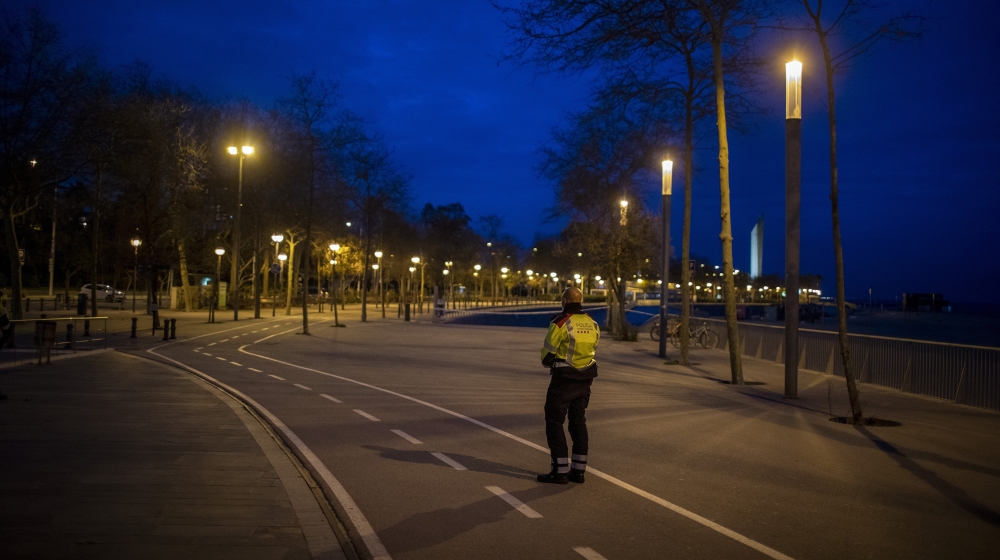As Spain records deadliest day, coronavirus lockdown stirs unrest
As deaths rise, footage emerges of police hitting man with baton while almost 1,000 are arrested for flouting rules.

Madrid, Spain – As coronavirus killed a record 849 people in Spain in one day, there were signs of unrest as the weeks-long lockdown aimed at reducing deaths and limiting the infection’s spread stirred tensions in the country.
On Tuesday, health authorities announced Spain’s deadliest day yet since the epidemic began, bringing the grim tally of fatalities to 8,189.
Keep reading
list of 3 itemsCoronavirus: Which countries have confirmed cases?
Exclusive: Inside a hospital battling coronavirus in Spain
Another 9,222 people tested positive for the virus, raising the number of confirmed cases to 94,417 – more than China’s 82,240 but fewer than Italy’s more than 100,000.
Amid the grief, as Spain entered its third week of lockdown, police were accused of using violence to enforce strict restrictions on movement, as hundreds were arrested or fined for flouting the measures.
In one video clip that has been shared widely on social media, officers in northwest Spain’s Basque Country are seen stopping a 22-year-old man and asking him three times why he was out on the street with his mother.
Under Spain’s state of emergency regulations, citizens can only go out alone to buy food, seek medical care, for emergencies or to work in essential industries.
When the man, identified by local media as being of Moroccan background, refuses to explain, officers ask to see his papers.
The film then shows that when the man approaches an officer, he is pushed back to a wall and hit twice with a baton.
Witnesses watching from flats above yell: “Abuse! Abuse!”
His mother, who tries to intervene, is also knocked to the ground by officers.
La Ertzaintza detiene a un joven, su madre agrede a uno de los agentes y también es detenida.
Mientras, desde los balcones, les arrojan objetos, les insultan y les llegan a desear su muerte.
Fuente @CasoAislado_Es pic.twitter.com/adip6hJqO3— Antidisturbios 🇪🇸 (@FuerzasDelOrden) March 30, 2020
Both were arrested for attacking police officers and will appear in court at a date yet to be confirmed.
An internal investigation has been launched by the Ertzaintza, the regional police force in Basque Country.
Protesters in the city banged pots and pans in Bilbao to protest after the incident on Sunday.
SOS Racismo, an anti-racism organisation, said in a statement: “The police are subjecting people to police abuse, intensified by the lockdown that we are living at present as a society.”
A spokesman for the Ertzaintza told Al Jazeera the man claimed he was infected with coronavirus and spat at an officer.
“This man refused various times to explain why he was contravening regulations governing confinement. He and his mother were arrested for attacking officers,” he said.
Meanwhile, as police carry out checks across Spain, officers have arrested 926 people and fined 102,000 for flouting lockdown restrictions.
Most of those stopped and fined were trying to go to their second homes, which is forbidden under the regulations. Fines vary from 100 euros ($110) to 600,000 euros ($658,000) for a serious abuse of emergency restrictions, such as protesting near infrastructure including power stations or transit hubs.
However, critics fear the rules are not being applied consistently, while experts worry about the long-term effects of isolation.
Before the state of emergency came into force, Spanish police detained a French man who was taking part in the Camino de Santiago religious pilgrimage.

Civil Guard officers detained three men near Barcelona on Tuesday who were carrying a large axe in their car.
“We suspect that they were going to rob a company because there is no security around to guard these places now,” a police source told Al Jazeera.
Diego Redolar, a neuroscientist at the Open University of Catalonia, said continued confinement may harm sleep patterns.
“The time change in an isolated situation can alter the adaptation of biological rhythms, especially in the elderly and children.
“It leads to less exposure to sunlight and more exposure to mobile phones. These can affect the quality of sleep.”
But Jose Ramon Alonso, a professor of neuroscience at the University of Salamanca, praised “a spirit of solidarity” among Spanish people.
“Most people are staying inside and obeying the rules. Of course, there are always a few idiots who break the law,” he told Al Jazeera.